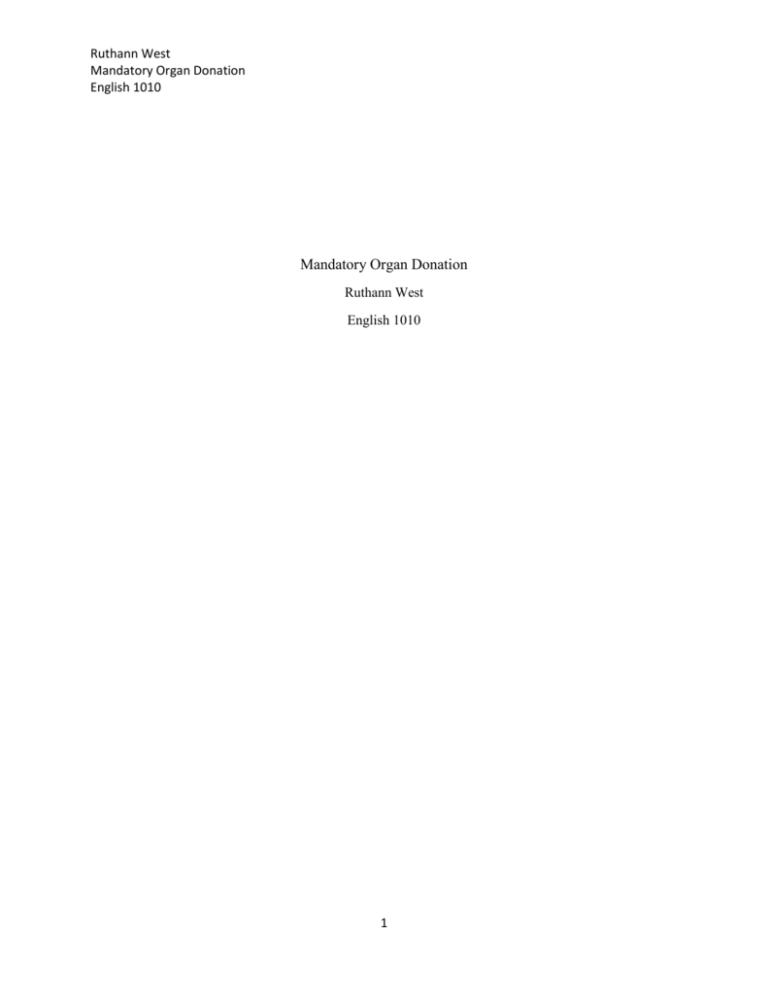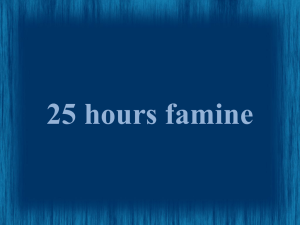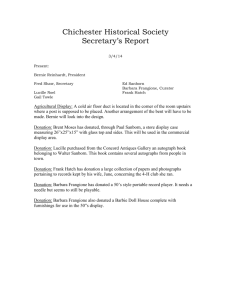File
advertisement

Ruthann West Mandatory Organ Donation English 1010 Mandatory Organ Donation Ruthann West English 1010 1 Ruthann West Mandatory Organ Donation English 1010 Organ Donation (This information and discussion is given under the assumption that any donors are legally, verifiably deceased) What do most people think when they hear the term “mandatory organ donation”? Many jump to religion- or lack thereof- as their decider. Some factor in their personal views on altruism or politics. Most people have a mix of any of these factors and more when making a decision for or against “mandatory” organ donation. The idea of mandatory organ donation is a concern for many; countries around the world have tried to instill this or something like it into their systems. However, the misconception about mandatory organ donation, is that it really doesn’t exist right now. What most consider a mandatory legislation is actually a “presumed consent” program. Even this is a concern for many. The presumed consent system and the prospect of mandatory organ donation are complex issues that tie together, with mainly two viewpoints: for, or against. Part of the push for a more mandated organ donation system comes from the shortage of eligible transplant organs the medical field sees. The waitlist in America is much longer than the number of those who sign up to donate each year. The number of those who are signed up to donate is larger than the number of those who are eligible to give when the time comes. Thus, a shortage is created. Every ten or so minutes, another person is added to the “waitlist”. Every day, it is estimated that seventy nine people receive a transplant, but twenty one more die because they did not receive one when they needed one (US Department of Health and Human Services, “Need is Real”). 2 Ruthann West Mandatory Organ Donation English 1010 The argument has been made before that the survival rate of an organ transplant is not one hundred percent. According to the US Department of Health and Human Services, this is a valid point. However, the argument could also be made that there is a survival rate at all. The statistics are shown: Kidney (from a deceased donor): 83.4% Kidney (from a living donor): 92% Heart: 76.8% Liver (deceased donor): 74.3% Liver (living donor): 81.3% Lung: 55.2% (US Department of Health and Human Services staff, “Need is Real”) Presumed consent was introduced primarily to lower wait times for transplants. Austria and Australia use this system, to name just a couple. “Presumed consent” is an opt-out system, versus an “opt-in” system. For example, America is an opt-in system. A person is considered to be a non-donor if they are found without identification, or if they have not marked “Y” on their driver’s licenses. In an opt-out system, a person is considered an organ donor if they are found without identification, or if they have not specifically opted OUT of donating on whatever identification is available to them (McGraw-Hill Dictionary). The idea of presumed consent is to lower wait list times and save extra lives that wouldn’t have been salvaged otherwise. Switzerland has a very low post-mortem donation rate compared with other European countries, which is potentially because of the lack of presumed consent law (Weiss, 1-7). Surveys done have shown no more negative feedback about donation, compared to other countries with higher rates. However, the opt-out system may not be responsible for a higher donation rate, either. Studies done that have shown an increase in donation after presumed consent legislation was introduced, cannot conclude that the increase was due to the legislation 3 Ruthann West Mandatory Organ Donation English 1010 alone. These countries generally focus even more on patient/population education as well (Rithalia, 338). Possibly the most complicated aspect of this issue is religion. Religion is the main cause of the controversy surrounding mandatory organ donation, understandably. All religions discussed here tend to focus on the ethical question of verifiable death, but again, this discussion itself is focusing on post-mortem donation, without the added complication of how to define it. Religion can make one’s decision about whether or not to donate in an opt-in system, and it is believed that some religions are against organ donation at all, mandatory or otherwise. Catholicism and those with the same basic doctrines (Lutherans, Episcopalians, etc), believe in organ donation, but under certain circumstances. All of these circumstances preclude completely a system involving mandatory organ donation. Informed consent is a main concern for this religion, but the term “ashes to ashes” is used frequently among members of the church (Lay Witness Staff, Lay Witness). Judaism is widely believed to condemn organ donation, but actually, the Jewish religion believes that saving another life overrides any small danger to the individual (which is the concern, they are to avoid danger to themselves in reverence of life and its value). There is controversy just within this religion, however, as not all organs harvested from a body are always used to directly save a life. This takes mandatory organ donation completely out of the question. Having a rabbi consult before organs are removed is encouraged here (Moss, 5775). The Church of Jesus Christ of Latter Day Saints, or the LDS religion, preaches 4 Ruthann West Mandatory Organ Donation English 1010 “the donation of organs and tissues is a selfless act that often results in great benefit ...The decision to will or donate one’s own body organs or tissue for medical purposes, or the decision to authorize… is made by the individual or the deceased member’s family (HRSA Staff, “Religious Views on Donation”).” This by definition condones organ donation as a whole, but condemns the idea of mandatory organ donation. Atheists have varied views, as they’re not dictated at all by the guidelines of religion. This is more based upon individual views. These are but a few examples of how religion can influence the decision to be for or against mandatory organ donation, or presumed consent. Most religions either encourage organ donation, or leave it up to the individual to decide. They rely on informed consent and freedom of choice- even more “strict” religions, such as Islam or Jehovah’s Witness. The medical field, when a patient is verifiably dead (this means there is no question as to brain death vs activity; no question to whether or not the patient’s body is alive- that is a discussion for another time), is a little less complicated right now. Most of those who work in the medical field are absolutely for organ donation, and completely against making it mandatory. A survey of the professionals working for Utah’s local Intermountain Healthcare system showed an overwhelming majority against mandatory donation. The reasons are varied; a few stated they wanted to keep the altruism involving donating. Altruism is a major component of organ donation as a whole. Those who donate feel good about making the choice to donate, to help others. Introducing a mandatory system to organ donation would take that from those who do choose to help, making the idea even less popular (Spranger, Bioethics Program). 5 Ruthann West Mandatory Organ Donation English 1010 Some were against due to the trauma it could cause the already grieving family. Most were against it because of the “slippery slope” making anything involving an individual’s body mandated by the government could create. In a survey of fifty-six individuals, forty-seven were against mandatory donation, and nine were for mandatory organ donation. The few that were for, felt that way because of the lives that could be saved- or even just bettered- by one person’s death. Three specifically mentioned the presumed consent system and how it would be a good compromise in America. Money is another part of this issue. The rich are privileged in many ways; healthcare is no exception. “Rich people can pay, poor people can’t. ‘There’s a huge triage involved in getting in,’ Arthur Caplan, chair of the department of medical ethics at the University of Pennsylvania, told CNN. ‘If you’re a homeless alcoholic sleeping on the streets of L.A., and you’re going toe to toe with Steve Jobs, you’re going to lose.’(Rall, p.10)” It is believed that introducing a mandatory organ donation system would take away the “wait-list cutting” that the rich are able to ensure; thus making the system itself fair, equal, and more efficient. A “slippery slope” was mentioned previously, and this refers to the question: if a government is given total control over one aspect of an individual’s life, what is to stop it from assuming complete control and domination? “Opening the flood gates” could be used to describe the same concern. Making organ donation mandatory is considered a slippery slope by manywhat is to stop them (the government) from then making decisions on who an individual is to marry, or procreate with (Spranger, Bioethics Program)? 6 Ruthann West Mandatory Organ Donation English 1010 It’s rare to find an individual who just doesn’t care one way or another, once the subject has been explained. Mandatory organ donation doesn’t exist yet, and the idea of presumed consent is still rather new and very controversial. The subject as a whole is complex, not because of multiple sides of the controversy, but because of the multitude of issues it presents. Religion, politics, individualism and altruism, money, and universal ethics are all factors here; these are only the ones this paper has covered. When other things, like brain-death and the morals surrounding organ harvesting while the body still lives come into play, a brand new facet of the problem opens up. Each corner turned has a new issue revolving around organ donationmandatory organ donation could clear this up, or cloud it further. As of now, the subject remains extremely clouded. 7 Ruthann West Mandatory Organ Donation English 1010 Works Cited: Lay Witness Staff, “Play It Again Organ Donation”. Article, Lay Witness, Catholic United for the Faith, INC. 2001. Web. URL: http://www.catholiceducation.org/en/science/ethical-issues/play-it-againorgan-donation.html McGraw-Hill Concise Dictionary of Modern Medicine. © 2002 by The McGrawHill Companies, Inc. Web. URL: http://medical-dictionary.thefreedictionary.com/Presumed+Consent Moss, Aron. “Organ Donation”. Article, Nissan 22. 5775. April 11, 2015. Web. URL: http://www.chabad.org/library/article_cdo/aid/635401/jewish/OrganDonation.htm Rithalia, McDaid, Suekarran, et. Al, “Impact of Presumed Consent for Organ Donation on Donation Rates: A Systematic Review”. BMJ 2009; 338. 15 January 2009. Web. URL: http://www.bmj.com/content/338/bmj.a3162.long Spranger, Theresa. “Mandatory Organ Donation: Ethical or Outrageous?” Bioethics Program Blog for Alumni, 2014. Web. URL: https://thebioethicsprogram.wordpress.com/2014/05/16/358/ US Department of Health and Human Services Staff. “Religious Views on Organ Donation”, Health Resources and Services Administration. Web. URL: http://www.organdonor.gov/about/religiousviews.html 8 Ruthann West Mandatory Organ Donation English 1010 US Department of Health and Human Services Staff. “The Need is Real: Data”, Health Resources and Services Administration. Web. URL: http://www.organdonor.gov/about/data.html 9




